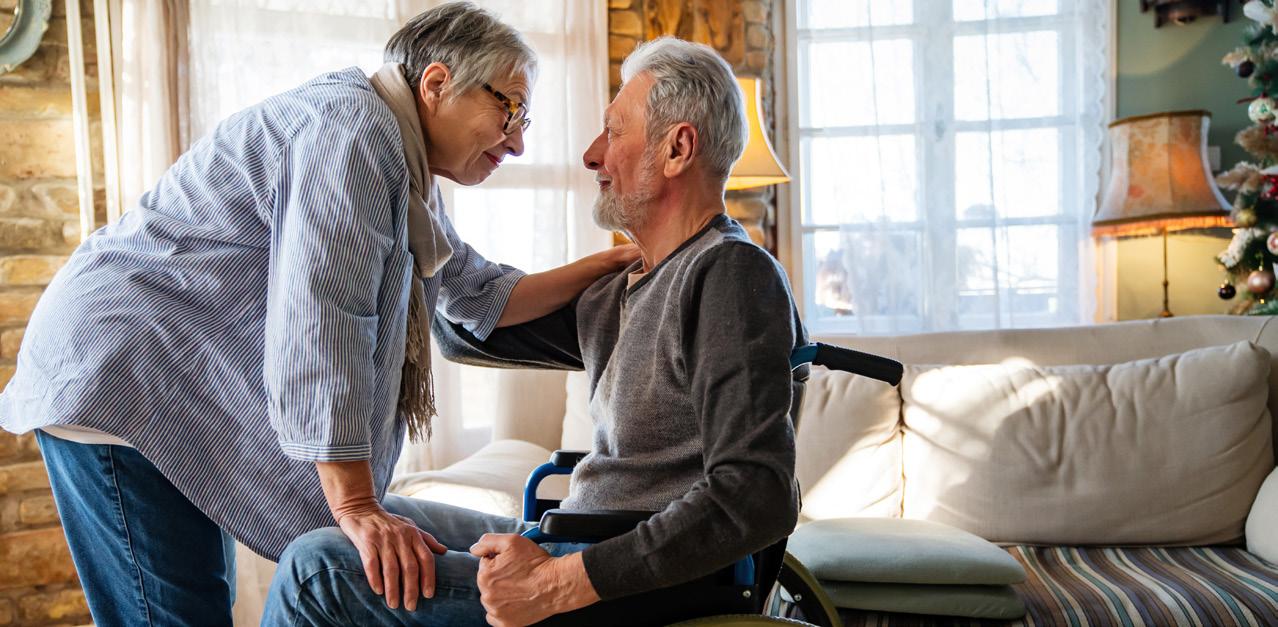
3 minute read
HOME HEALTH CARE
How do I know if I am Homebound?
The word homebound scares a lot of people, however when you look at the criteria more closely, it is less alarming to consider. For individuals to assess their 100%-covered homecare benefit through Medicare, they must meet certain requirements.
It’s important to understand that being considered homebound is not a permanent label. Often times it is a temporary precaution. For example, if someone is at higher risk for contracting illness such as COVID-19 or have a higher likelihood of complications, their doctor might advise them to remain homebound as much as is reasonable. Additionally, if a patient has received a surgery and they are homebound during the recovery, Medicare will cover needed services under the home health benefit during that time. In cases where patients no longer meet the homebound criteria, they can transition to outpatient services. These services are covered up to 80% through a Medicare benefit for those who qualify. In general, Medicare considers a person homebound if they are unable to leave their home without difficulty. Sometimes, they use the phrase ‘taxing effort’. So, what exactly does taxing mean? What constitutes difficult? These are common questions that even professionals in the field need to discuss at times.
First of all, as mentioned previously, homebound status can be temporary. It is typically due to advanced age, illness, surgery or a disability. Secondly, Medicare considers you homebound if you need the help of another person or the aide of medical equipment to leave your home. This could be crutches, a wheelchair, or a walker. An individual may also be considered homebound if their doctor believes that the individual’s health or illness could get worse if they leave their place of residence. Lastly, Medicare has made some adjustments due to COVID-19. If the patient has a medical condition which makes them more at risk for contracting COVID-19 and/or experiencing severe outcomes due to COVID-19 exposure, the person can meet the homebound requirement for home health services.
Can I leave my home at all?
Yes! Even if you are homebound, you can still leave your home for the following: • Medical treatment such as kidney dialysis, chemotherapy treatments, radiation therapy • Regular doctor’s appointments • Religious services • Adult day care Leaving home for short periods of time or for special nonmedical events such as a family reunion, funeral, or graduation, most often do not affect homebound status. Recipients of home health under Medicare may also take occasional trips to the barber or beauty parlor, grocery store, or even a short walk. However, these events must be infrequent and for short periods of time.
Who ultimately decides if someone is homebound?
Generally, the person’s primary physician makes that determination. Often times, providers have questions themselves about what Medicare considers homebound. When home health is working with patients, they are continually assessing homebound criteria. Homehealth professionals are the best resource for helping to determine if the homebound criteria are being met under the Medicare benefit. Because there are so many nuances to meeting these criteria, at times even professionals may misinterpret who may or may not meet the guidelines. Also, providers are diligent about accurately making this assessment, as Medicare can and will deny payment for services rendered if the homebound criteria is in question. This diligence can lead to an overly conservative decision about homebound status. If it is not determined that an individual meets homebound requirement, and you believe that they do, additional questions are appropriate. ■
KELLY SIMMONS ADARA HOME HEALTH
To learn more, visit adarahomehealth.com










